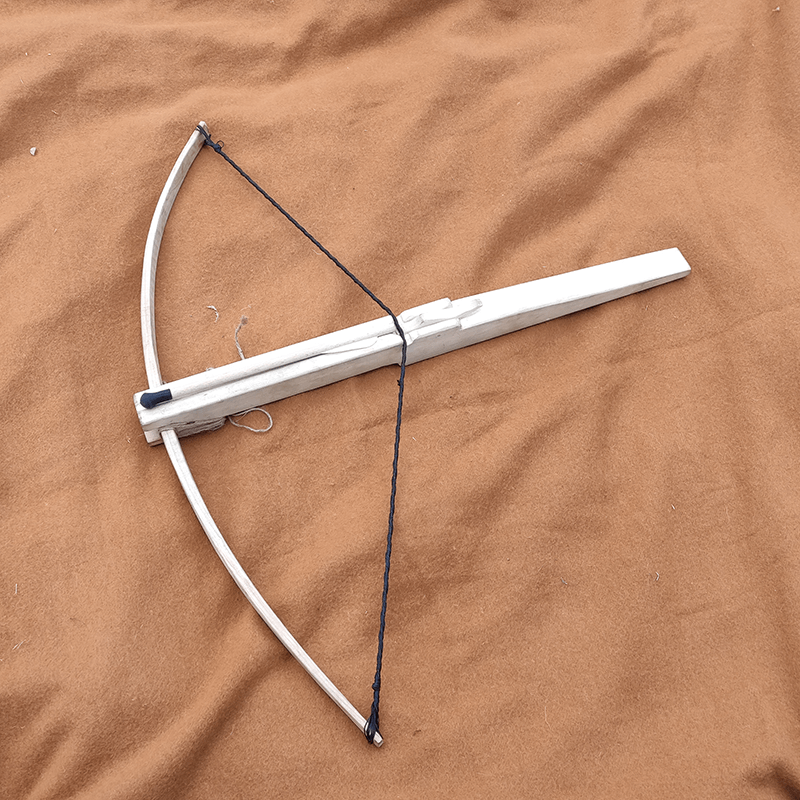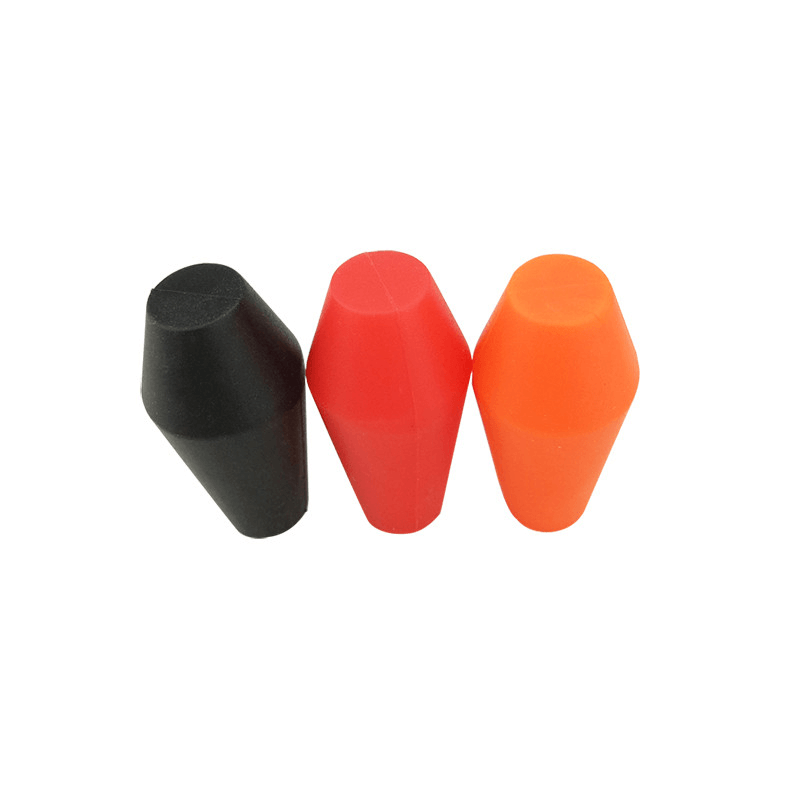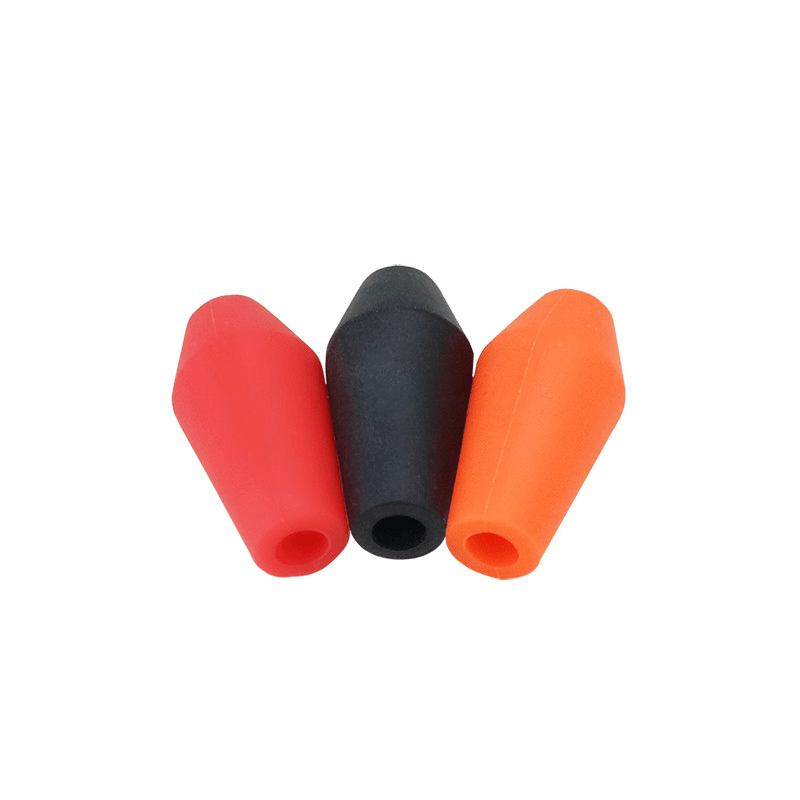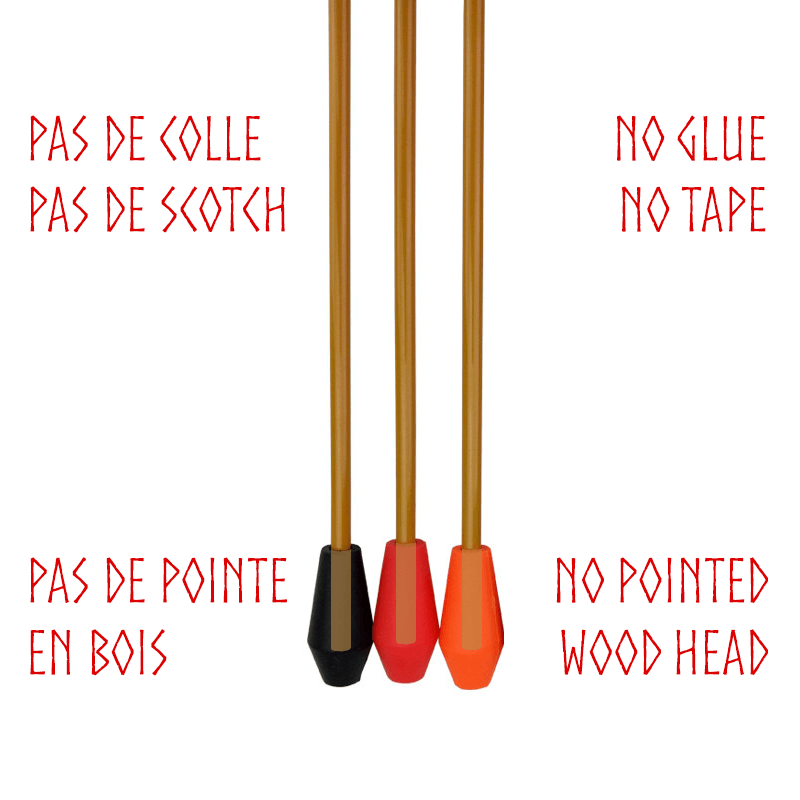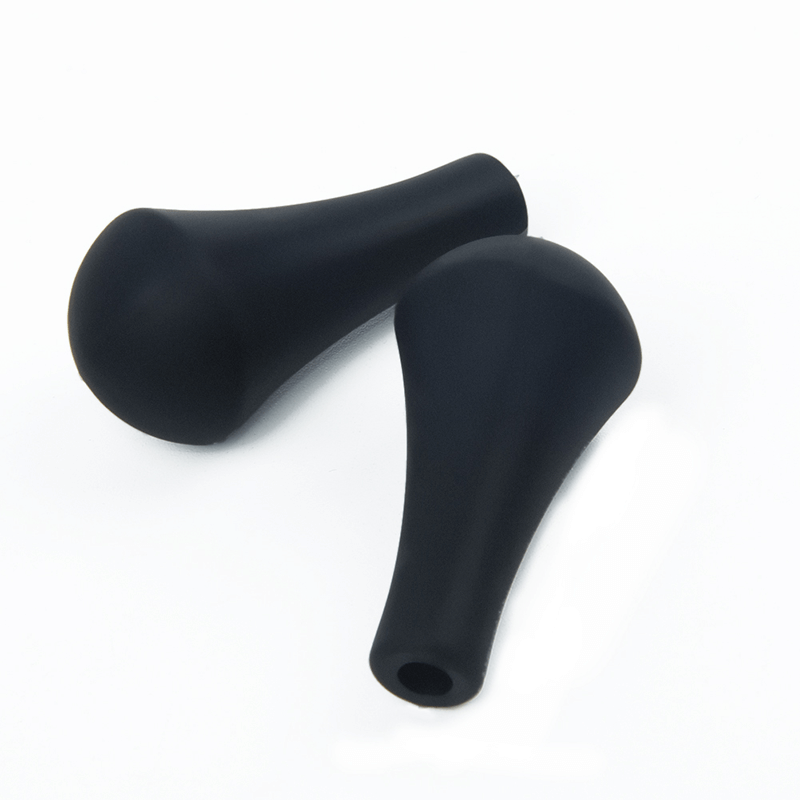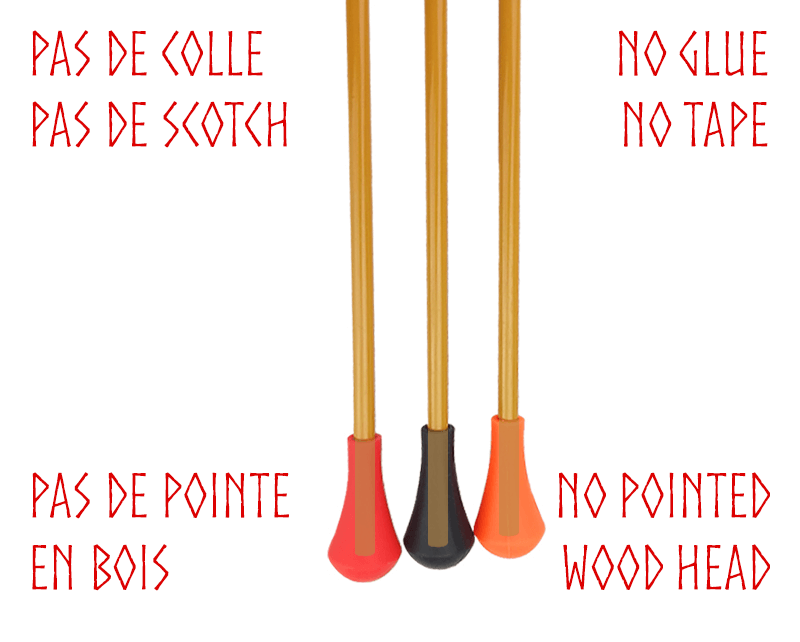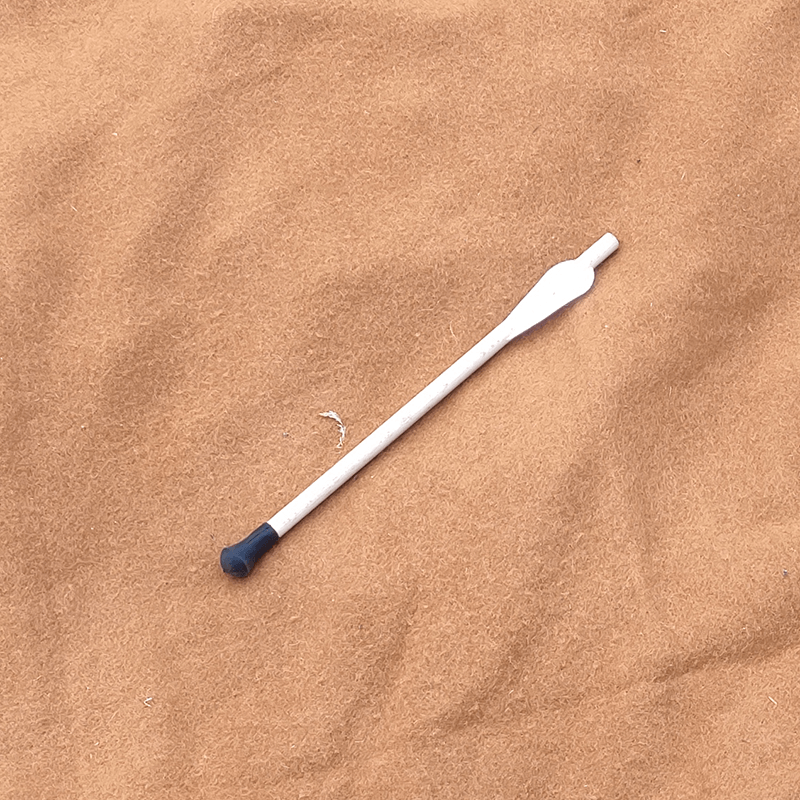Weapons
If we want armies that are consistent in terms of weaponry and armor, we need to take the time to collect and study historical and archaeological data. We have drawn conclusions that we present to you here. We also had to make certain compromises between historicity and security.
The proportion of certain weapons and protections is limited to respect the reality of a battlefield. An average is given to you, by group of five or ten fighters. The limitations on the number of weapons and protections apply to all fighters registered in the same group. It is up to everyone to respect this in order to have consistent armies in terms of armament.
The organization reserves the right not to validate a weapon if they judge that the shape, the weight or the size can be dangerous during the fights even if this one respects the regulation below.

Spear (javelin, one handed, two handed)
Easily and quickly crafted, easy to use. Thrown, carried with one hand or two, it is seen as the weapon of the poor, yet it is still the ruler of the battlefield.
Number authorized for 5 warriors: Illimited
During fights: In order to offer different combat and feelings, polearms are sometimes not allowed on the battlefield. We therefore recommend that you come with a valid weapon in order to be able to participate in these specific battles.
For 2-handed spearmen, during large battles and certain other activities, a shield on the back, or on the side, is mandatory. We therefore recommend that you have a reliable and solid attachment system that allows you to carry it on your back. Warning ! A shield worn in front of either is forbid as is removing it voluntarily during battle.
Security: Only a blunted heel can be used to strike with it and only commercial blunts are authorized.
Rubber blunts must be taped (black, gray or silver tape) to the shaft (see photos) to avoid any risk of being torn off during fights.
Aspect: The spears must have the most realistic appearance possible, not a "cotton swab" aspect.
Authorized material: Rubber blunt Any other material is prohibited (steel, wood, etc.)! Solid wood shaft
Diameter: the shaft must be at least 2.5 cm
Length: 2m maximum and 1m40 minimum (shaft and head included)
Weight: !!! NEW !!!The total weight of the spear is according to its length:
200cm max. : 900g min.
180cm max. : 800g min.
160cm max. : 700g min.
140cm : 600g min.
As soon as you exceed a level of length, it is the ratio with the higher level that applies (eg: 183cm => 900g).
The weight must be placed as close as possible to the blunt, no additional counterweight authorized!
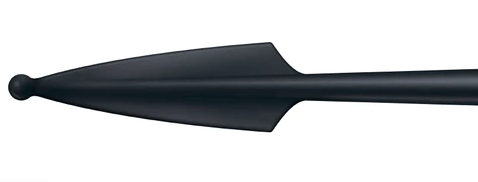 !!! Warning !!! From the Herja 2022 edition, spear blunts that are too soft will no longer pass the weapon check!
In particular the cold steel synthetic lance heads which are sold by Black Armory for example.
!!! Warning !!! From the Herja 2022 edition, spear blunts that are too soft will no longer pass the weapon check!
In particular the cold steel synthetic lance heads which are sold by Black Armory for example.The reason is simple, they are really too soft which greatly disturbs the perception of the keys, it is difficult to know if it has been touched directly or if it is simply an oscillation of the blunt.
Our advices
Note that there are a multitude of solutions to achieve the right weight. To start, we advise you to favor a shaft diameter between 2.8cm and 3cm.
You can also add ballast to your spear (see our tutorials), while making sure to a correct general appearance as well as optimal safety for the other fighters.
Do not hesitate to contact us beforehand to suggest your ideas or to pre-check your weights!
We recommend
Over time we have tried a multitude of rubber nibs from different vendors. Now with weight restrictions, fairly thin blunts end up having a reduced lifespan. We therefore recommend the Pointe de rubber lance sold by Faits d'Armes which, in our opinion, offers the best quality/lifespan/price ratio.
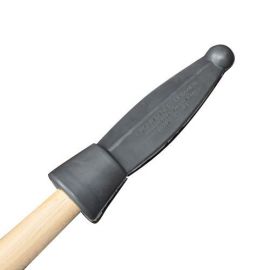

Heavy spear
The particularity of these heavy spears comes from the fact that the large size of their iron gives them the ability to strike in size. Thus, they can be used to slash, slash, and carve!
Number authorized for 5 warriors: 1 only
During fights: In order to offer different combat and feelings, polearms are sometimes not allowed on the battlefield. We therefore recommend that you come with a valid weapon in order to be able to participate in these specific battles.
For 2-handed spearmen, during large battles and certain other activities, a shield on the back, or on the side, is mandatory. We therefore recommend that you have a reliable and solid attachment system that allows you to carry it on your back. Warning ! A shield worn in front of either is forbid as is removing it voluntarily during battle.
Key rules:
One-handed: same touch rules as for one-handed spears
Two-handed: same touch rule as two-handed spears AS WELL as swords.
Aspect: The spears must have the most realistic appearance possible, not a "cotton swab" aspect.
Authorized material: Rubber or nylon/plastic blunt! Solid wood shaft
Blunt blade length: 40cm minimum
Total length: 2m maximum (shaft and head included)
Diameter: the shaft must be at least 3cm
Weight: The head + the ballast must weigh 600 g.
The ballast must be placed as close as possible to the blunt, no additional counterweight authorized!
Security: Only a blunted heel can be used to strike with it and only commercial blunts are authorized.
Blunts must be taped (black, gray or silver tape) to the shaft (see photos) to avoid any risk of being torn off during fights.
Heavy spears must not be thrown!
Our advices
Note that there are a multitude of solutions to achieve the right weight. To start, we advise you to favor a shaft diameter of 3cm or more.
You can also add ballast to your spear (see our tutorials), while ensuring a correct general as well as optimal security for the other fighters.
Do not hesitate to contact us beforehand to suggest your ideas or to pre-check your weights!
We recommend
Currently we have found only one supplier who manufactures this type of blunt suitable for HEMA to materialize a heavy pole: Spear V4 - Short Blade and Spear V4 - Long Blade from Black Fencer.
Do not hesitate to contact us if you know of other manufacturers who make blunts that would correspond to this type of weapon!
Our Tutorials
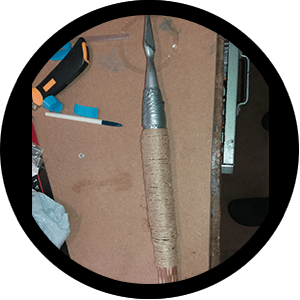 Method of weighting
Method of weightinga spear

Seax, scramaseax and sword
The seax, symbol of the free man, and the scramaseax, its evolved form, are both very good tools and fearsome weapons. As for the sword, sign of wealth, its entire design is aimed toward one goal: to fight.
Number authorized for 5 warriors: 1 sword/langseax/saber, Unlimited for the rest
During fights: In order to offer different combat and feelings, polearms are sometimes not allowed on the battlefield. In these specific battles, the one-to-five restriction for swords/langseax/sabers no longer applies to make it easier for you to access one-handed weapons.
Aspect: only historical armament for the Viking, Slavic, Frankish and Byzantine period is allowed. These weapons must have a scabbard.
Size: beyond 40cm in total length, it is considered as a sword/langseax/saber
Authorized material: steel, nylon/plastic
Security: Your weapons must be in good condition and secure: no rust, no burrs, no splinters, no sharp edges or points, blunt greater than or equal to a €2 coin.
Our advices
If you are new to the practice and you do not plan to do reenactments, especially Eastern/Western style fights, we advise you to go with a weapon with a nylon blade rather than a steel one.
There are several reasons for this, firstly plastic/nylon blades are much cheaper and more easily available on the internet for example.
Second, these blades are suitable for the practice of HEMA and Huscarl, logical at the same time given that it was designed for, where the protections can be lighter than in some other practices. In particular, they have a much thicker edge than steel swords, which widens the impact area and is less likely to cause serious injury to your opponent.
We recommend
Of the different swords tested we recommend the Viking nylon sword sold by Black Fencer. It has a rendering very close to a histo weapon thanks to its guard and its steel pommel while being correct in terms of weight, and the thick nylon blade gives you security during battles.
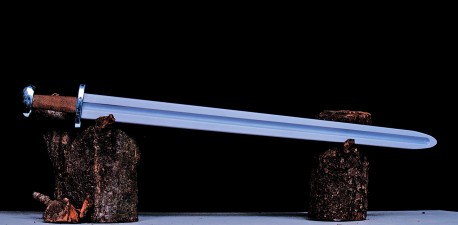
Our Tutorials

Axe (one-handed)
One of the most required tool at the time. Used to work but also to fight, until the birth of axes only destined to war.
Number authorized for 5 warriors: Illimited
Security: Your weapons must be in good condition and secure: no burrs, no splinters or no sharp edges.
Aspect: only historical armament for the Viking, Slavic, Frankish and Byzantine period is allowed.
Authorized material: Rubber, Nylon, Plastic Any other material is prohibited (steel, wood, etc.)!
Length: 80cm maximum (from the upper point to the bottom of the handle)
Our advices
During combat, axes, especially the handles, can be put to the test. This is why we advise you to come with one or more handles extra in case of breakage.
We recommend
Ax blunts need to be solid because they are subjected to powerful and repeated shocks, but they must also be able to withstand the significant tensions undergone during picking, for example. We therefore recommend the Axe (1 hand ) synthetic ARCEM sold by Black Armoury which to date offers the best resistance and lifespan, while having a historic look and easy assembly.
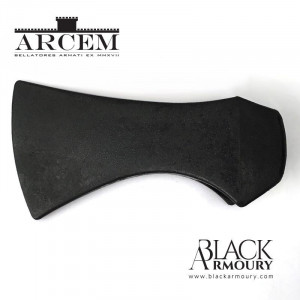
Our Tutorials
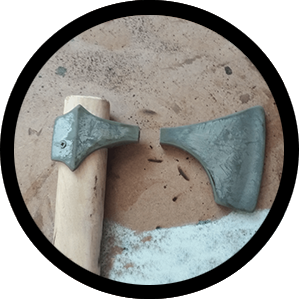 Fix a broken
Fix a brokenplastic/rubber ax

Ax (two handed)
A fearsome weapon, forged for battle, only carried by elite warriors, feared among all on the battlefield. Those axes have a devastating potential, be it against a shield, a helmet, or a chain mail.
Number authorized for 5 warriors: 1 only
During fights: In order to offer different combat and feelings, polearms are sometimes not allowed on the battlefield. We therefore recommend that you come with a valid weapon in order to be able to participate in these specific battles.
During major battles and certain other activities, a shield on the back, or on the side, is mandatory. We therefore recommend that you have a reliable and solid attachment system that allows you to carry it on your back. Warning ! A shield worn in front of either is forbid as is removing it voluntarily during battle.
Authorized material: Caoutchouc Any other material is prohibited (steel, wood, etc.)! Solid wood handle
Length: 1m20 maximum (blunt included)
Diameter: the handle must be at least 3 cm
Weight: The rubber head + the ballast must do 800 gr.
The weight can be placed at the level of the handle, as close as possible to the head, it is not necessary (see not recommended) to place it at the level of the blunt.
Our advices
Note that there are a multitude of solutions to achieve the right weight while ensuring a correct general appearance as well as optimal safety for other fighters.
For this we offer several tutorials to help you.
Do not hesitate to contact us beforehand to suggest your ideas or to pre-check your weights!
During combat, axes, especially the handles, can be put to the test. This is why we advise you to come with one or more spare handles in case of breakage.
We recommend
For the moment we have only found one type of blunt to simulate a large 2-handed ax, it is a rubber head that can be found in black or silver. You can find one at a good price at Faits d'Armes.
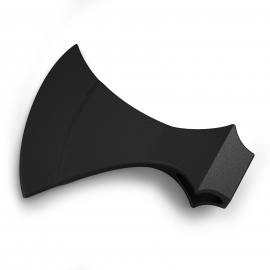
Our Tutorials
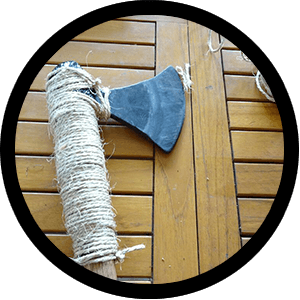 Method to ballast
Method to ballasta danaxe

Shield
Uncontested symbol of the viking warrior. As much a defensive weapon as an offensive one, it is the warrant of the life of its bearer, despite its thin thickness and its apparent weakness.
Number authorized for 5 warriors: 1 per person obligatory
During fights: During major battles and certain other activities, a shield on the back, or on the side, is mandatory. We therefore recommend that you have a reliable and solid attachment system that allows you to carry it on your back. Warning ! A shield worn in front of either is forbid as is removing it voluntarily during battle.
Aspect: It must have a strapping which must be in good condition (fabric, leather, rawhide).
The shield must be in good condition (not broken, no holes, no splinters…).
The top must have a fabric (linen look) or leather cover.
Authorized material: Wood of 0.8cm minimum thickness
Viking shield: The shield must be round and flat, have an umbo as well as a handle.
Dimensions: 70cm minimum, 1m maximum
Slavic shield: There are several types of shield for this people. For the moment we allow 3:
- The round shield like that of the Vikings
- The lenticular shield like that of the Vikings but lenticular instead of flat
- The shield drop-shaped (see photos), curved or flat, without umbo. Inevitably two crossed leather ties on the hand and at least one single on the forearm (belt buckle possible).
Dimensions: minimum 90cm high for 45cm at the widest, maximum 150cm high for 60cm at the widest (keep fairly close proportions)
Franc shield: There are several types of shield for this people. For the moment we allow 2:
- The round shield like that of the Vikings
- The oval shield which must be oval and curved, without umbo and have straps as attachments (see photos)
Dimensions: 70cm minimum and 90cm maximum wide, 90cm minimum and 1m maximum high
If you wish to use another typology, do not hesitate to contact us so that we introduce it into the rules.
Byzantine shield: The drop-shaped shield with the same rules as for that of the Slavic.
Our advices
For the Huscarl, we realized during our practice that a light shield is important so that it can be mobile and manageable correctly. This also allows you to wear it longer and thus reduce the fatigue caused.
This is why we recommend the use of plywood for the top with a thickness of 0.8cm or even 1cm, a correct compromise between weight and resistance/durability. Beyond that, it gives a shield that is often too heavy.
In terms of dimensions, we recommend a medium or even small size, to gain in responsiveness and maneuverability. 80cm do the trick for example.
Of course, these are just tips from our own experiences. Each person is different, with their own preferences and constraints. You must therefore adapt your equipment to your requirements.
We recommend
Unlike a real fight, for our practice the shield must only resist the hit. It must therefore be solid, especially at the level of the slices which tend to quickly break and crumble, which is dangerous for you and for your opponents.
This is why we recommend the use of rawhide (untanned hide) to make the strapping of your shield. This material has the particularity that once wet it becomes very malleable, which makes it easier to lay on the edges. But once it becomes dry again, the rawhide becomes very hard and resistant to shock, thus increasing its longevity.
You can also double the layer of rawhide on the places that suffer the most impact, but beware of the weight that this adds.
Our Tutorials
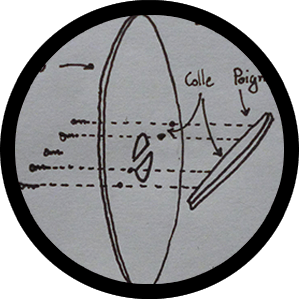 Make a
Make aViking Shield

Bow
Used in a first time to hunt and fish, the bow is a real technological advancement. It will compensate for the lack of strength of the user wielding it to better their speed, range and power of the projectile's impact. Nothing more was needed to make it a dreadful weapon. Its crafting does not require expensive materials which make it very common tool.
Number authorized for 5 warriors: Illimited
During fights: During major battles and certain other activities, a shield on the back, or on the side, is mandatory. We therefore recommend that you have a reliable and solid attachment system that allows you to carry it on your back. Warning ! A shield worn in front of either is forbid as is removing it voluntarily during battle.
For certain activities, throwing and shooting weapons are not authorized. We therefore recommend that you have combat equipment (spear, axe, etc.) to participate in these activities.
Aspect: Quivers should look historically compatible (wool, wood, and leather).
Single bow:
Made from a single piece of wood, suitable for all peoples living in contact with forests (Viking, Frank...)
Authorized material: Wood (or history compatible)
Maximum power: 25 pounds
Dimensions: 160cm min., 190cm max.
Compound Bow:
Suitable for Slavic or even Swedish or Danish (peoples who have trade with the East)
Authorized material: Wood (or history compatible)
Maximum power: 25 pounds
Dimensions: 120cm min., 150cm max.
Our advices
...
We recommend
The difficulty for the arches in Herja is that for reasons of historicity we ask for historically compatible dimensions and materials. But at the same time, a power of 25 pounds is required, which is relatively low in order to ensure the safety of the participants during the fights.
This is why we recommend the use of LARP bows, visually compatible with the right power, such as the Marksman / LARP bow, 70" (178 cm) light brown, 25 lb sold by Celtic Web Merchant.

Crossbow
The crossbow is a technological evolution of an already very popular weapon: the bow. With this new weapon, the physical strength of the user will be greatly relieved by a mechanical addition. This will make it all the easier to aim but also to use an increasingly powerful weapon. Of relatively simple design for a basic crossbow, the fighters could use this weapon without receiving a long and complex training for its handling.
Number authorized for 5 warriors: Illimited
During fights: During major battles and certain other activities, a shield on the back, or on the side, is mandatory. We therefore recommend that you have a reliable and solid attachment system that allows you to carry it on your back. Warning ! A shield carried in front of either is forbidden as is removing it voluntarily during battle.
For certain activities, throwing and shooting weapons are not authorized. We therefore recommend that you have combat equipment (spear, axe, etc.) to participate in these activities.
Aspect: Quivers should look historically compatible (wool, wood, and leather).
Authorized material: Wood (or compatible history)
Maximum power: 25 pounds
Geographical area: Franc only

Arrows & bolts
We have tested several specific blunts for our practice and for the moment we have validated 2 types both in terms of safety and resistance to wear.
!!! WARNING !!! Only these two types of blunts are validated for checks! These points do not require glue or tape, they must all be removable for rigorous verification!
Only wooden arrow shafts/bolts are allowed. They must be in good condition so as not to present a risk to the participants.
Remember to make your arrows/bolts identifiable so you can easily find them among the others after the battle!
Blunt #1
To buy:Attention, les temps de livraisons peuvent varier et être relativement longs !
Blunt #2
To buy:Please note that delivery times may vary and be relatively long!

Rock
One of the easiest ressources to aquire ! Stones, used whether to hit or be thrown, are easy to use and become very lethal during a fight.
Only the stone simulators offered by the organization are used.
A stone can be re-rolled multiple times without any restrictions.
As a sidearm, only hits to the head count.

Slingshot
The slingshot, easy and cheap to make, is found among the most dreadful weapons. Used since antique times, maybe even before, it allows to multiply the strength and the speed of a small projectile when being thrown.Relatively easy to use, it becomes a lethal instrument when handled by an experimented person.
Only stone simulators offered by the organization are authorized as a projectile.
A stone can be re-thrown multiple times without any restrictions.
Number authorized for 5 warriors: Illimited
Authorized material: leather and rope
Pocket size: 15cm x 4cm (recommended for our projectiles)
Recommended length: slinger arm length



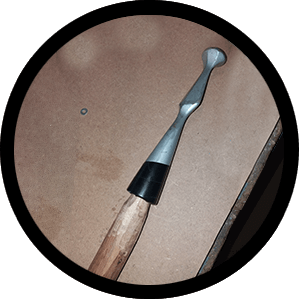 How to mount
How to mount







 And you ? what type of warrior are you?
And you ? what type of warrior are you?
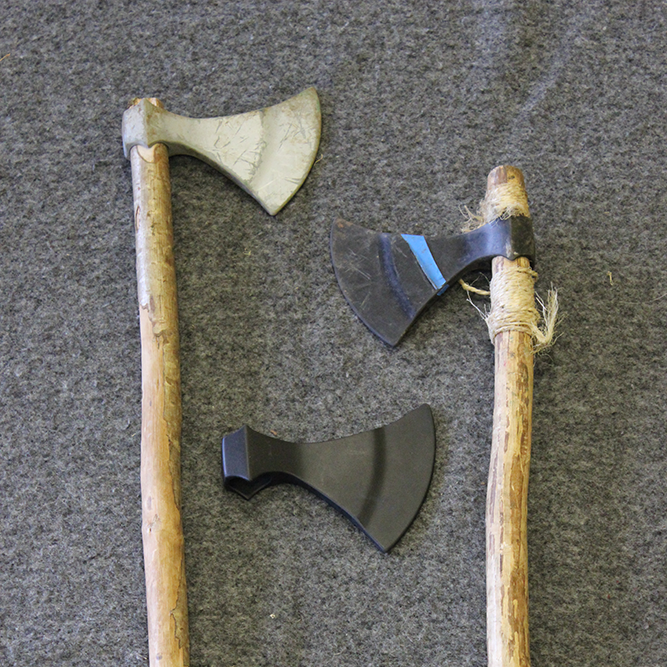



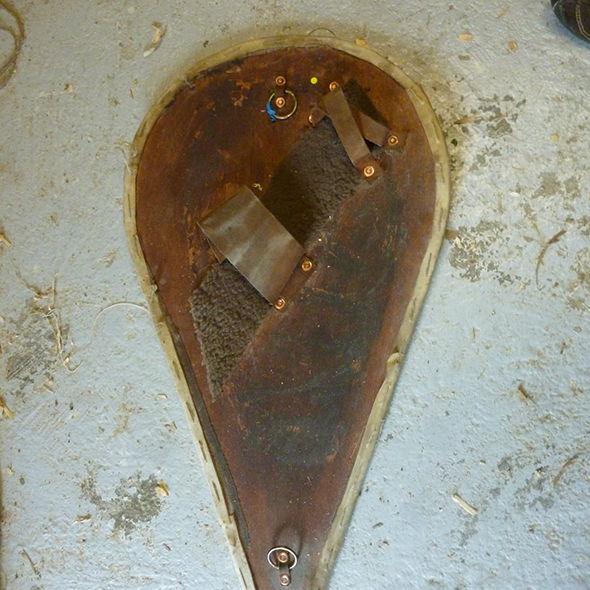
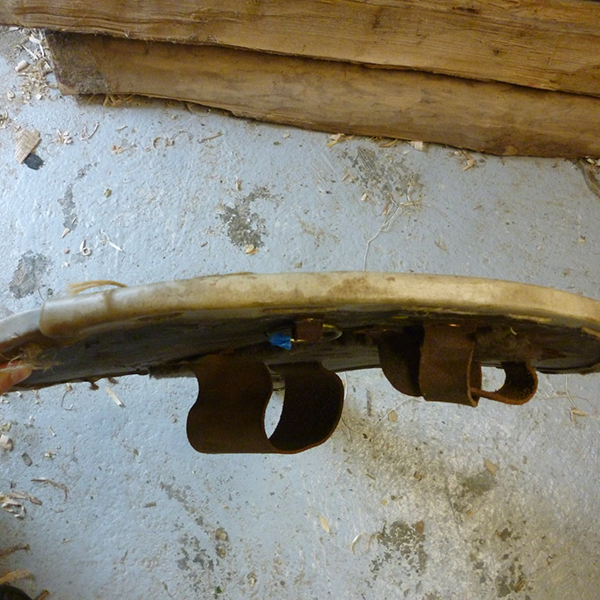






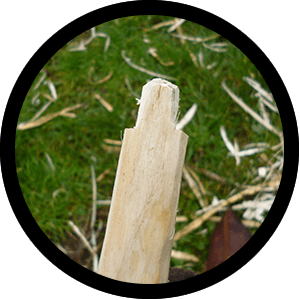 Make a Simple Bow
Make a Simple Bow